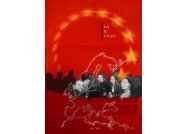turkish-greek civic dialogue - AEGEE Europe
turkish-greek civic dialogue - AEGEE Europe
turkish-greek civic dialogue - AEGEE Europe
You also want an ePaper? Increase the reach of your titles
YUMPU automatically turns print PDFs into web optimized ePapers that Google loves.
MOUDAINA BAND &<br />
ÇAKMAKLI CLARINET<br />
................................................................................. Hüseyin Türker Değirmenler<br />
Moudania Municipality Council Member<br />
Since I am a child of Crete origin, I have observed the<br />
Turkish-Greek relations throughout my all life carefully.<br />
After the Turkish war of Independence in 1923, the<br />
Treaty of Lausanne was signed and together with this<br />
Agreement a protocol was also signed connected with<br />
an exchange of Turkish and Greek People. According to<br />
this protocol Muslim Turkish people and Orthodox Greek<br />
people were exchanged with each other and they would<br />
never come back to their homeland again.<br />
One morning I had woken up with the call to prayer. I hadn’t finished my<br />
breakfast yet. I didn’t know why but the church bells began to ring continuously.<br />
I felt that some strange things would happen. As soon as I put on my clothes<br />
I went out. I walked towards the plane tree. Greeks and Turkish people had<br />
gathered to understand what was happening. Venizelos and Mustafa Kemal<br />
had reached an agreement. Therefore we (the Turkish people) would abandon<br />
Crete and would not be allowed to come back again. Both of the communities<br />
were bewildered by these decisions.<br />
Everybody was rushing from one place to another and trying to find out<br />
whether this news was true or not. We were surprised at this bad news because<br />
people were accepted like goods as if they had no thoughts and wills. They had<br />
to leave their homeland where they had lived for three centuries.<br />
In order to settle there, they had to sacrifice many people so they felt as if<br />
they were unfaithful to their ancestors. In those years they had struggled to<br />
be able to live there and lost a lot of things. Now this society sharing common<br />
fate didn’t exist.<br />
Association des Etats Généraux des Etudiants de L’<strong>Europe</strong><br />
We (the Turks) haven’t explained Atatürk’s<br />
principle and our devotion to these<br />
principles to the Greeks clearly. We can<br />
neither give nor get any inches of this soil<br />
that was determined by Atatürk’s ‘’Misak-ı<br />
Milli’’. National Soil Politics has adjusted<br />
to this principle, nothing contradicting<br />
with this principle has ever been done or<br />
could be done.<br />
One of Atatürk’s sayings ‘’ Peace at home,<br />
Peace in the World’’ is our guarantee<br />
for this principle. This devotion shows<br />
Turkish people’s point of view about<br />
Cyprus, continent and air shelf and armed<br />
islands. None of the enmity includes wars.<br />
Consequently, there must be peace in<br />
Mediterranean so, our Misak-ı Milli border<br />
can be in safety and our existence can<br />
maintain day by day as a whole.<br />
Why didn’t we fight in the second World<br />
War? Why didn’t we accept Dodecanese<br />
Islands offered to us? Because, we don’t<br />
need new land, new confusion, new pain.<br />
We only need to advance and together with<br />
the West we need to catch happiness and<br />
live in peace.<br />
Global world must bring peace not wars.<br />
Our politicians must take lessons from<br />
our history, they must show respect to<br />
themselves and their rights, they must<br />
present peace to our society and they must<br />
themselves also live in peace.<br />
Population Exchange







